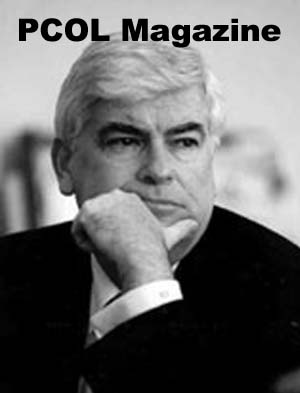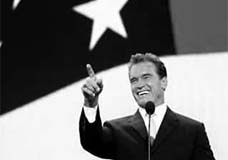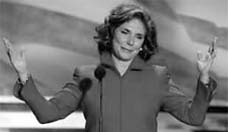
Senator Chris Dodd has low profile, few enemies. Some say he has been too quick to compromise.
Dodd: Too Eager To Be Liked?
Senate Race Consummate senator has low profile, few enemies. Some say he has been too quick to compromise.
September 28, 2004
By DAVID LIGHTMAN, Washington Bureau Chief
WASHINGTON -- Ask about Chris Dodd and George Allen, the Republicans' top attack dog on Senate politics this year, instantly plasters a roguish smile on his face.
He's the head of the national GOP senatorial campaign effort and his mission is to crush Dodd and other Democrats. So, Allen is asked, how would you run against the Connecticut Democrat?
Allen tries hard not to laugh. "I don't want to say something partisan," he says diplomatically, "and sound like I'm yapping like a dog."
Not when it comes to Chris Dodd. Few Washington insiders - and judging from the polls, his Connecticut constituents - have much bad to say about the senior senator as he seeks a fifth term. "A good man to work with," says Sen. Mike Enzi, R-Wyoming, who's teamed up with Dodd on securities issues.
But all this good fellowship masks questions that Washington chatterers routinely ask about the 60-year-old senator: Is he so eager to be liked and respected that he is too eager to compromise? Is he relegated to being a perennial No. 2, unable to win major chairmanships or leadership spots, and ready to ascend to elder statesman status? Does that matter?
It's always difficult to measure any senator's effectiveness, because one politician's strengths can be just as easily viewed as weaknesses. Taxpayer groups have spent 25 years railing against Dodd for opposing big Republican-authored tax cuts; budget-watching groups hail those same votes. Family research organizations brand Dodd an unwavering liberal who is too quick to back abortion and gay rights; women's and civil rights groups consider him a hero.
Some watchdog groups see Dodd as all a senator should be. "He's effective. He affects other senator's votes," said Joan Claybrook, president of Public Citizen, a nonprofit consumer group that has clashed with Dodd on many issues. "He's very shrewd and chooses his issues carefully."
But conservative analysts see Dodd as someone who has not realized his potential.
"Is he a player? Not really. He's not one of the mavericks and he's not one of the go-to guys," said Tripp Baird, director of Senate relations at the conservative Heritage Foundation and a former strategist for Republican Sen. Trent Lott of Mississippi.
Dodd heartily disputes such characterizations. He rattles off a string of bills he shepherded through Congress over the last six years - help for firefighters, historic corporate reforms, election-law overhaul, and so on.
He is proud of the way he does business. "I have to operate with 534 other people and the White House. You can't do it on your own," he explains.
Dodd joined the Senate in 1981 at 36. While his staff at the time whispered he was a future White House contender, the senator himself always spoke of some day chairing a committee or being a Senate leader.
His musings then on how he'd serve are little different from his outlook now: He'd become expert in a few subjects he cared about, work quietly to craft legislation, avoid making personal enemies and eventually ascend to the kind of major chairmanship that would make him the man to see on those pet subjects.
Dodd proceeded to follow a traditional, even quaint, Senate path, one that means inching up the ranks from the inside.
In an era when TV appearances and sound bites make stars of senators, Dodd has not gained the national cachet of others, including Connecticut colleague Joe Lieberman.
Dodd had a popular two-year run as party general chairman in the mid-1990s, but other efforts at the political heights fell short - his 1-vote loss for Democratic leader to Tom Daschle in 1994 and his flirtation with a White House bid last year.
Dodd says he's content as he plays the Senate waiting game. His ascension to major chairmanships is blocked by members - and friends - with more seniority: Joseph Biden of Delaware at foreign relations, Edward Kennedy of Massachusetts at labor and Paul Sarbanes of Maryland at banking. Daschle is in the way of any leadership bid, and should John Kerry lose the presidency, Dodd will have to vie with New York Sen. Hillary Clinton, 2004 vice presidential nominee John Edwards and others for attention if he wants to make a White House bid.
He disputes the idea that big titles or superstardom matter, noting that former New York Sen. Jacob Javits, "one of the two or three most effective senators of the last 50 years," was never in the majority and had no chairmanships.
"I can't control these things," Dodd says. "Your Senate career is determined not by the titles you hold, but by the difference you make in people's lives."
The Senator
He's a doer who knows his issues and has an uncanny ability to build the kind of bipartisan coalitions that gets bills passed. He's also known as a fierce Democrat, one of the few old-time orators left in Washington who can light a fire under the faithful. And he has become one of the party's wise men, the private counselor who would play golf with President Clinton - and no one knew about it until weeks later.
In a Senate where Republicans have a two-seat majority - enough to hold leadership positions but short of the 60 votes needed to stop a filibuster - "he's one of the eight or 10 Democrats who decide if anything gets done," said Doug Sosnik, former Dodd chief of staff, now a top strategist for John Kerry's campaign.
Perhaps Dodd's most important legislative accomplishment this term involved election reform. As chairman of the Rules Committee in 2001, he was handed the task of figuring out a way to clean up a process Democrats were still seething over.
It looked like Dodd's bipartisan magic would evaporate this time, as the GOP wanted no part of any reform bill with Democratic fingerprints - especially since African Americans, a loyal Democratic constituency, were pushing particularly hard for changes.
Dodd presented reform as a civil rights issue, but Republicans insisted it was a matter for states to deal with. In one moment, extraordinary for the usual genteel Senate, GOP senators refused to attend Dodd's bill-writing session in 2001.
But after a year of closed-door negotiations, Dodd brokered a compromise that is providing billions of dollars to states to improve their voting systems and reduce wrongful disenfranchisement.
There are critics who wonder if Dodd is using his clout wisely, if he's too quick to compromise for the sake of victory.
David Williams, vice president for policy at Citizens against Government Waste, thought Dodd too quick to go along with big spending bills, such as the catch-all measure last fall that kept the government funded.
"There's this view that everyone should go along out of expediency," said Williams, because there's no other option.
But what if the bill failed, he said - wouldn't that force lawmakers to make serious budget cuts? Such criticism is misplaced, says Dodd: "Republicans brought that bill up."
Perhaps ironically, despite the praise lobbed his way by Republicans, Dodd also has a reputation as one of his party's most ardent partisans.
He is known for being quick to react if he thinks his party has been wronged. In 1994, after Democrats lost control of both Houses for the first time in 40 years, most of his embarrassed, confused colleagues disappeared - and a key spokesman, House Speaker Tom Foley of Washington, had lost his re-election bid. Dodd was all over the airwaves, defending his party.
President Clinton noticed Dodd's effort, and a month later tapped Dodd to be the party's general chairman.
He has also been unrelenting on Iraq. Though he supported giving President Bush broad authority to conduct the war in 2002, he says today "there wouldn't have been a vote if we knew then what we know now. Only the threat of weapons of mass destruction caused us to vote as we did."
Asked if he would back the war without that threat, Dodd said, "Of course not."
Dodd's other Washington role is the nearly elder statesman, someone with a keen understanding of the gentle rhythms that govern the world's most exclusive club. He was here as a child, watching his father serve from 1959 to 1971, and can spew the Senate's history like sports fans can recall batting averages.
And so, when there's a diplomatic envoy needed, Dodd is summoned. In 2001, with the Senate in a 50-50 split, Vermont Sen. James Jeffords, then a Republican, sought out Dodd to discuss a party switch.
Trust already existed: One of Dodd's father's closest friends was Vermont Republican Sen. George Aiken, and the son and Jeffords had long been allies on child care and special education issues.
That spring, Jeffords was upset that President Bush was not providing more funds for special education. Dodd would become Jeffords' sounding board, a sympathetic ear. Nothing leaked out. Jeffords stunned the political world when he left the GOP that May, giving control of the Senate to the Democrats for the next 18 months.
The Years Ahead
Whatever his titles may be should he win re-election, Dodd has an agenda that includes a new examination of world hunger, a national Center for Transportation Solutions that would seek fresh ways to handle American travel and commuting, more school funding and help for the poor through the No Child Left Behind law, more funding for police and firefighters and renewed efforts to develop strong ties with Latin American nations.
He says he's unconcerned whether he winds up with a big committee chairmanship, or if his time in the leadership has finally come, or whether the White House path will get any smoother in 2008.
It's more likely that Dodd will survive as the consummate man of the Senate.



